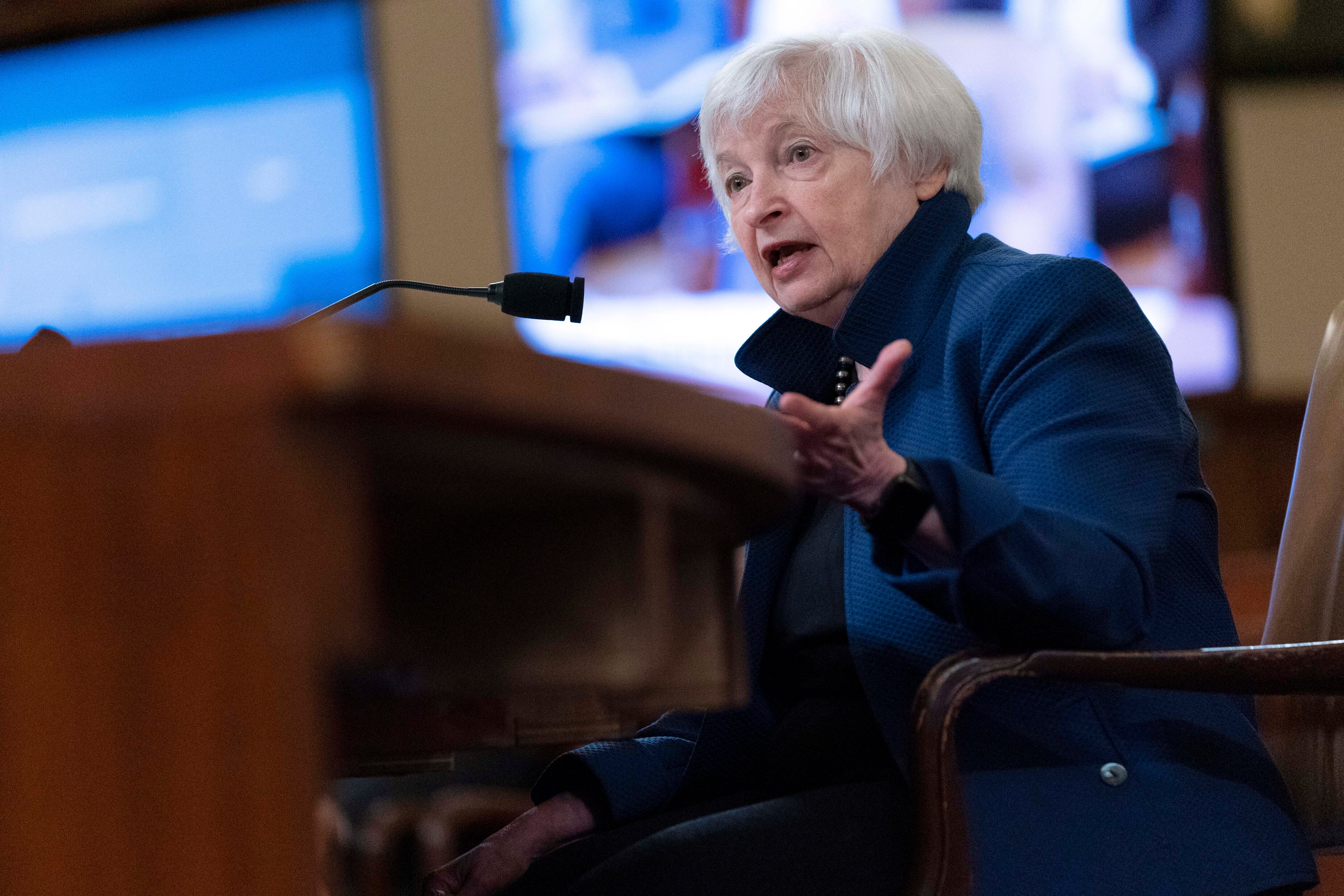Yellen downplays US recession as wave of economic data looms
Treasury Secretary Janet Yellen says the U.S. economy is slowing but pointed to healthy hiring as proof that it is not yet in recession

Your support helps us to tell the story
From reproductive rights to climate change to Big Tech, The Independent is on the ground when the story is developing. Whether it's investigating the financials of Elon Musk's pro-Trump PAC or producing our latest documentary, 'The A Word', which shines a light on the American women fighting for reproductive rights, we know how important it is to parse out the facts from the messaging.
At such a critical moment in US history, we need reporters on the ground. Your donation allows us to keep sending journalists to speak to both sides of the story.
The Independent is trusted by Americans across the entire political spectrum. And unlike many other quality news outlets, we choose not to lock Americans out of our reporting and analysis with paywalls. We believe quality journalism should be available to everyone, paid for by those who can afford it.
Your support makes all the difference.Treasury Secretary Janet Yellen on Sunday said the U.S. economy is slowing but pointed to healthy hiring as proof that it is not yet in recession.
Yellen spoke on NBC's “Meet the Press” just before a slew of economic reports will be released this week that will shed light on an economy currently besieged by rampant inflation and threatened by higher interest rates. The data will cover sales of new homes, consumer confidence, incomes, spending, inflation, and overall output.
The highest-profile report will likely be Thursday, when the Commerce Department will release its first estimate of the economy's output in the April-June quarter. Some economists forecast it may show a contraction for the second quarter in a row. The economy shrank 1.6% in the January-March quarter. Two straight negative readings is considered an informal definition of a recession, though in this case economists think that's misleading.
Instead, the National Bureau of Economic Research — a nonprofit group of economists — defines a recession as “a significant decline in economic activity that is spread across the economy and lasts more than a few months.”
Yellen argued that much of the economy remains healthy: Consumer spending is growing, Americans' finances, on average, are solid, and the economy has added more than 400,000 jobs a month this year, a robust figure. The unemployment rate is 3.6%, near a half-century low.
“We’ve got a very strong labor market,” Yellen said. “This is not an economy that's in recession."
Still, Yellen acknowledged the economy is “in a period of transition in which growth is slowing," from a historically rapid pace in 2021.
She said that slowdown is “necessary and appropriate," because “we need to be growing at a steady and sustainable pace.”
Slower growth could help bring down inflation, which at 9.1% is the highest in two generations.
Still, many economists think a recession is on the horizon, with inflation eating away at Americans' ability to spend and the Federal Reserve rapidly pushing up borrowing costs. Last week, Bank of America's economists became the latest to forecast a “mild recession” later this year.
And Larry Summers, the treasury secretary under President Bill Clinton, said on CNN's “GPS” Sunday that “there's a very high likelihood of recession," as the Fed lifts interest rates to combat inflation. Those higher borrowing costs are intended to reduce consumer spending on homes and cars and slow business borrowing, which can lead to a downturn.
On Wednesday, the Federal Reserve is likely to announce its second 0.75% point increase in its short-term rate in a row, a hefty increase that it hasn't otherwise implemented since 1994. That will put the Fed's benchmark rate in a range of 2.25% to 2.5%, the highest level since 2018. Fed policymakers are expected to keep hiking until its rate reaches about 3.5%, which would be the highest since 2008.
The Fed's hikes have torpedoed the housing market, as mortgage rates have doubled in the past year to 5.5%. Sales of existing homes have fallen for five straight months. On Tuesday, the government is expected to report that sales of new homes dropped in June.
Fewer home sales also means less spending on items that typically come with purchasing a new house, such as furniture, appliances, curtains, and kitchenware.
Many other countries are also grappling with higher inflation, and slower growth overseas could weaken the U.S. economy. Europe is facing the threat of recession, with soaring inflation and a central bank that just last week raised interest rates for the first time in 11 years.
European Central Bank President Christine Lagarde also sought to minimize recession concerns in an news conference last Thursday.
“Under the baseline scenario, there is no recession, neither this year nor next year,” Lagarde said. "Is the horizon clouded? Of course it is.”